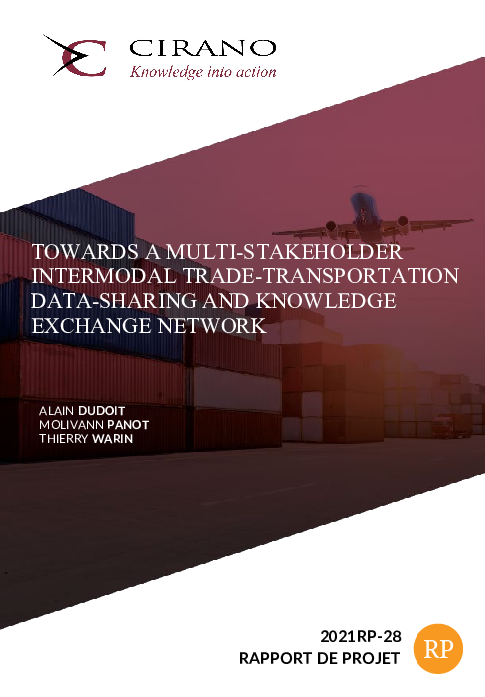Towards a multi-stakeholder Intermodal Trade-Transportation Data-Sharing and Knowledge Exchange Network
The performance of supply chains used to be mainly the concern of academics and professionals who studied the potential efficiencies and risks associated with this aspect of globalisation.
In 2021, major disruptions in this critical sector of our economies are making headlines and attracting the attention of policy makers around the world. Supply chain bottlenecks create shortages, fuel inflation, and undermine economic recovery.
This report provides a transversal and multidisciplinary analysis of the challenges and opportunities regarding data interoperability and data sharing as they relate to the ‘Great Lakes - St. Lawrence Seaway Trade Corridor’ (GLSLTC)’s intermodal transportation and trade data strategy. The size and scope of this trade corridor are only matched by the complexity of its multimodal freight transportation systems and growing urbanization on both sides of the Canada-US border. This complexity is exacerbated by the lack of data interoperability and effective collaborations between the different stakeholders within the various jurisdictions and amongst them.
Our analytical work relies on :
1) A review of the relevant documentation on the latest challenges to supply chains (SC), intermodal freight transport and international trade, identifying any databases that are to be used.;
2) A comparative review of selected relevant initiatives to give insights into the best practices in digital supply chains implemented in Canada, the United States, and the European Union.;
3) Interviews and discussions with experts from Transport Canada, Statistics Canada, the Canadian Centre on Transportation Data (CCTD) and Global Affairs Canada, as well as with CIRANO’s research community and four partner institutions to identify databases and data that they use in their research related to transportation and trade relevant data availabilities and methodologies as well as joint research opportunities.
Its main findings can be summarized as follow:
- GLSLTC is characterized by its critical scale, complexity, and strategic impact as North America’s most vital trade corridor in the foreseeable further intensification of continental trade.
- 4% of Canadian GDP is attributed to the Transportation and Logistics sector (2018): $1 trillion of goods moved every year: Goods and services imports are equivalent to 33% of Canada’s GDP and goods and services exports equivalent to 32%.
- The transportation sector is a key contributor to the achievement of net-zero emissions commitment by 2050.
- All sectors of the Canadian economy are affected by global supply chain disruptions.
- Uncertainty and threats extend well beyond the COVID-19 Pandemic.
- “De-globalization” and increasing supply chains regionalization pressures are mounting.
- Innovation and thus economic performance—increasingly hinges on the quantity and quality of data.
- Data is transforming Canada’s economy/society and is now at the center of global trade
- “Transport data is becoming less available: Canada needs to make data a priority for a national transportation strategy.” *
- “How the Government of Canada collects, manages, and governs data—and how it accesses and shares data with other governments, sectors, and Canadians—must change.”
For a more general literature review:
Alain Dudoit & Molivann Panot & Thierry Warin, 2021. "Bibliography: Towards a multi-stakeholder Intermodal Trade-Transportation Data-Sharing and Knowledge Exchange Network", CIRANO Project Report, 2021RP-28, CIRANO




